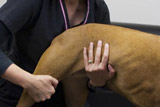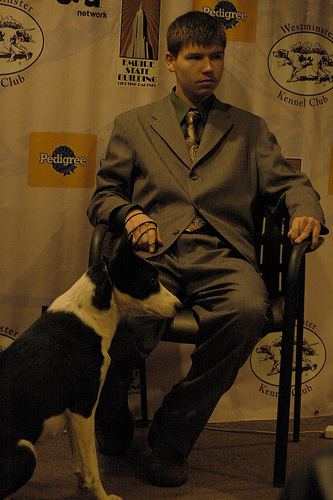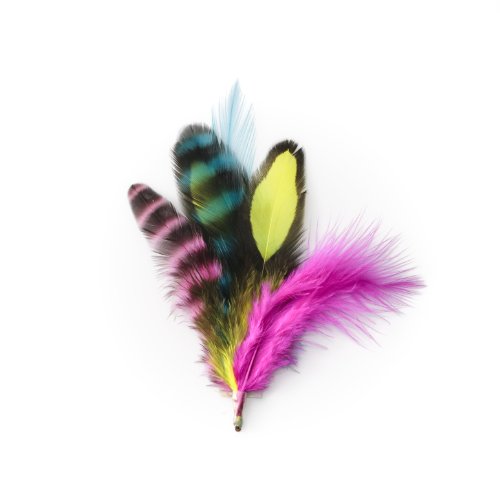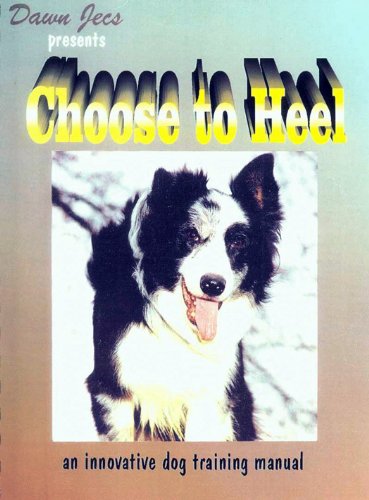
Congratulations on your new puppy! Cherish these weeks, because puppies grow up fast! Soon your cuddly little stuffed animal-sized puppy will become a full-grown large-breed adult. Having an adult dog come with a whole host of new challenges. In order to minimize the trouble that you will, inevitably, run into with your adult dog, it is absolutely necessary to start training your puppy now.
There is only one question to keep in mind when deciding how to train your new puppy. What kind of adult dog would you like to have? Hopefully the answer is a manageable, happy dog. In this article, we will go through some general tips for all puppies, discuss bad “cute” puppy habits, and touch on some specific concerns for large breed puppy owners.
For every puppy, large or small, there are some tips that will help you with regular handling of your dog. You should groom/brush your puppy every couple of days for a few minutes at a time. Although your puppy may not need to be brushed, it will get used to the sensations and restraint involved. Also, nail trimming does not have to be the fight that it often is. Take the time to play with your puppy’s paws everyday, tugging on the nails and massaging the footpads. Dogs actually tend to be very sensitive about having their feet handled, so this exercise will make your life much easier as your dog gets older. This is especially true in large breeds, which may be harder to physically restrain.
Most likely, at some point during your adult dog’s life, it will need medication. It may be as simple as two weeks of cleaning ears, or as routine as anti-seizure medication everyday for life. If you play with your puppy’s ears, eyes, and mouth, both you and your dog will be much happier when it comes time for medication. Look into your puppy’s ears and rub them a bit (something most dogs like). Make sure your puppy will allow you to touch around its eyes. Also become comfortable with opening the mouth and taking a quick look inside.
Just like a baby, it seems that everything a puppy does is cute! However, the same puppy that is playfully tugging on your shirtsleeve today will be ripping a large hole in your favorite jacket tomorrow. Along the same lines, that 20-pound Golden Retriever puppy that you share your chair with now will, in a year, to become an 80-pound space hog trying to claw its way onto your lap. Another “cute” puppy habit is growling. You should never allow your puppy to growl- not while playing, eating a treat, or talking to other dogs. Your puppy needs to learn that growling is not acceptable behaviour. There are times when dogs growl as a threat or display of dominance, neither of which is acceptable. Also, large-breed owners have a responsibility to realize that a stranger may very easily interpret even harmless “playful” growling as aggressive behaviour towards them or their dog. For your dog to fit into the social world of humans, it is not acceptable to growl.
Large-breed owners have one special consideration when it comes to training their puppies. You must always be in control of your dog. Your dog may top the scales anywhere from 60 to over 120 pounds. It is a problem when a dog that size wants to do something and you are not in control of it.Every large-breed dog needs to be comfortable with a leash and collar. Buy your new puppy a collar and teach it to walk without pulling. Start off in the backyard and slowly work your way up to areas with other people and animals. Recognize the responsibility you have to people who are, for cultural or personal reasons, afraid of dogs. Large dogs can be very intimidating. Do not allow your dog to bound up to strangers and especially do not allow them to jump up in greeting. Although your puppy may seem too small to pose a threat or knock you over, that same puppy will be a hurtling 80-pound weight in a year.
When training your large breed dog to be the perfect adult dog, recognize that the breed of your puppy will tell you a lot about the problems you will encounter as it becomes an adult dog. Some breeds explore the world with their mouths. In these dogs, it is important to teach and enforce the “drop” command. When you get your dog to “drop”, it will release whatever it was holding in its mouth. This is an important rule, because it is difficult to pry its mouth open if it has gotten a hold of something it shouldn’t eat or chew. Also, make sure to have control over when your dog eats, by making your puppy wait for a certain command before eating its food. Hopefully, this way, your adult dog will wait for your permission before eating something it found outside or on the kitchen floor.
Is your puppy a water-loving breed? You may have to sternly and quickly train your puppy to enter rivers, lakes, and swimming pools only with your permission. The same applies to scent and sight hounds. Also, breeds that are either very social or somewhat less social require extra socialization. Very social breeds need to learn controlled behaviour, while less social breeds need to learn to accept the presence of other humans and animals.
Although your puppy is cute and cuddly right now, it is essential that you keep in mind what kind of habits you want your adult dog to have. With the right amount of reinforcement (treats and love), you will be able to instill good habits at an early age. This way you can avoid many of the common problems that people run into as their dog gets bigger. Start working now with a trainer to make sure you prepare your puppy to become a happy and manageable adult dog!
By Ashley O’driscoll – Pets.ca writer
 Hip Dysplasia in Dogs
Hip Dysplasia in Dogs
Hip Dysplasia in Dogs
Hip Dysplasia in Dogs
 Junior Handler Shows Canaan Dog with Seizure Alert Skill - Westminster 2010
Junior Handler Shows Canaan Dog with Seizure Alert Skill
Junior Handler Shows Canaan Dog with Seizure Alert Skill - Westminster 2010
Junior Handler Shows Canaan Dog with Seizure Alert Skill
 How To Prepare For Getting Your First Puppy
So its that time in your lif
How To Prepare For Getting Your First Puppy
So its that time in your lif
 Fashion For Dogs: Trends and Styles for the Chic Pooch
Is your pooch chic? Then youll need to keep up with the
Fashion For Dogs: Trends and Styles for the Chic Pooch
Is your pooch chic? Then youll need to keep up with the
 Are Choke Collars Safe?
You see chokers everywhere-
Are Choke Collars Safe?
You see chokers everywhere-
Copyright © 2005-2016 Pet Information All Rights Reserved
Contact us: www162date@outlook.com